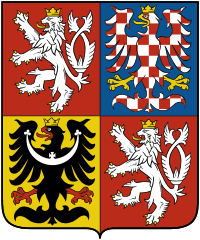#OurStories: Mentoring makes it easier for convicts to return to the world without bars

Published
VOL Mentorink project helps people in prison to find their way in society
Volonté Czech, a non-profit organization, has decided to fight the high rate of recidivism among offenders in the Czech Republic. It accompanies clients on their journey to freedom in five Czech prisons as part of the VOL Mentorink pilot project.

Prisoner in Jiřice Prison Prison in Světlá nad Sázavou
What does accompanying to freedom look like?
"We help with all kinds of problems and life situations of our clients: finances, including debts and insolvency, family relationships - we have a mediator who resolves various conflicts in the family, lawyers who deal with foster care. We provide retraining, courses, we provide language books for those interested in education, and even driving lessons," says mentor Eva Panská, who takes care of clients in the women's prison in Světlá nad Sázavou. Mentoring takes place about six months before and six months after release. "But I have a client who has been free for a long time and calls me all the time. I give my clients support and empathy in addition to the advice they need for life after leaving prison. The empathy is very important in this work," adds the mentor.
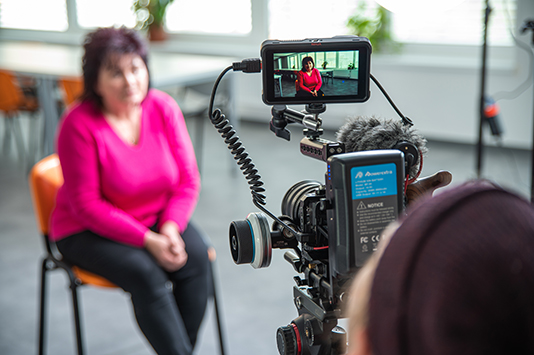
Eva Panská, mentor of Volonté Czech, talking about the work with prisoners
"The project is actually a pilot of what we should continue to do and what should be part of the legislative system in the Czech Republic, i.e., accompaniment after release. As society is changing, most people who are released do not know how to navigate it at all - they do not know that they can buy a train ticket from their mobile phones and that in some transport companies there is no other way to do so. And it is a pity, when we start working with them during their detention and everything seems to be on the right track, that we do not continue and there is no one who works with them after their release," explains Monika Myšičková, the director of the women's prison in Světlá nad Sázavou, the importance of the work of mentors.
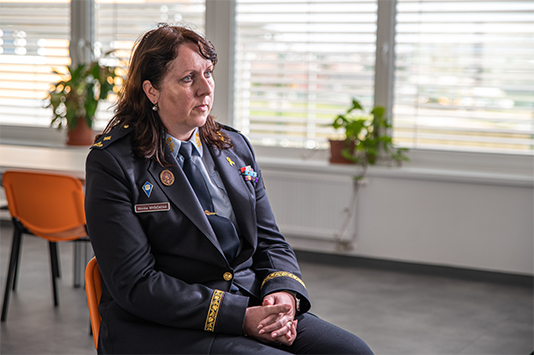
Monika Myšičková, directrice of the women´s prison in Světlá nad Sázavou
Fears of life "out there"
Milena Kuchšová, who is still preparing for her release, sums up the worries and fears of people behind bars: 'It's a big change for us, here we have certainty. When you come out, you have a lot of worries, a lot of work. That's why having a mentor, psychological support and encouragement for the next life is very important for people who are going out."
Ms Milena has to wait a few more months for her release. From the other side of the bars, Aneta N. evaluates the mentoring: "Mentoring brought me mainly orientation in debt. But it also helped me with my education; after my release I took computer courses. I also got a job. I got it on my own, but the mentoring gave me the confidence I needed to keep trying, even when various employers turned me down. I also got contacts to various companies that don't mind a criminal record. I work in a bakery now and I wouldn't change. My life is a lot calmer now."
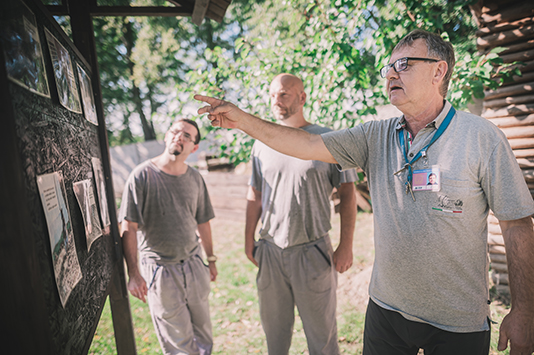
Work with the inmates, Jiřice prison
The director of the prison also praises the project: "The project is unique in that we can start preparing convicted women here in the prison for the journey that will follow after their release, and that is very important. We appreciate cooperation with the non-profit sector. We cooperate with Volonté Czech, which is our long-term and high-quality partner, in preparing women prisoners for their release from prison. After being released, women often have problems managing the situation outside and need support and guidance. We try to identify risks arising from criminal activity, very often it is drug addiction, but almost always it is debt. For example, a bad relationship in the family, with parents or a partner can be a triggering factor." According to Monika Myšičková, children who are left at home by their mothers while serving their sentences are secondary victims of the crime. "Often, it takes very little to prevent further recidivism of a woman after her release thanks to mentorink. And we prevent the children from losing their mother for another period of time," she adds.
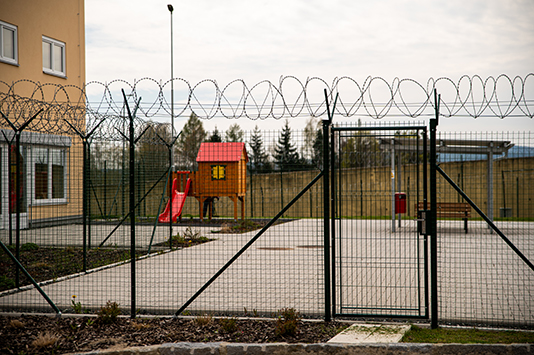
Playground in Světlá nad Sázavou prison
Five prisons are involved in the project. Apart from the women's prison in Světlá nad Sázavou, there are also prisons in Jiřice, Kynšperk, Hradec Králové and Všehrdy. In total, 150 inmates are to undergo mentoring as part of the pilot project.
The project is implemented in cooperation with the Norwegian partner - the Åpenthet company.
Running against prejudice - the Yellow Ribbon Run
Other projects and events, such as the Yellow Ribbon Run, are also dedicated to supporting convicted and released prisoners. A local race was held in Světlá nad Sázavou in April. The main run, already the 8th edition, took place on 20 June 2023 in Prague.
The run has come to us from Singapore, where prison staff run to support the employment of convicts. In the Czech Republic, however, both employees and current or former convicts run. "At the start of the race, you basically can't tell who is who," laughs prison director Myšičková. The run seeks to draw attention to the risks associated with committing crime and its impact on life. It also promotes the employment of male and female convicts, motivating them to work and to acquire work habits.
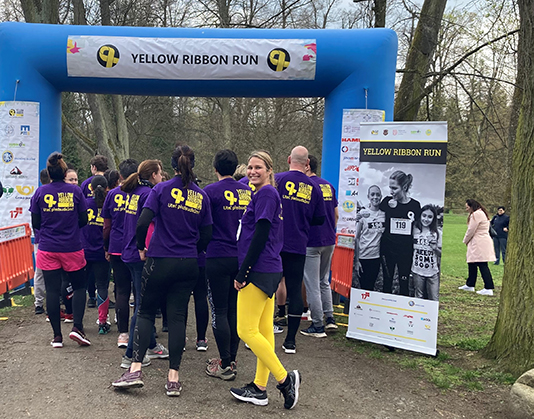
Running against prejudice - the Yellow Ribbon Run in Světlá nad Sázavou, April 2023
- More info: Volonté Czech (volonte.cz)
- More info: VOL Mentorink (norwaygrants.cz)
- More info: Běh se žlutou stužkou (yrr.cz)
VIDEO: https://www.youtube.com/watch?v=ebXoDC6yVwQ
Project VOL Mentorink is supported by Norway Grants via Justice Programme. The aim of the programme is a better correctional system. It supports systemic measures in the areas of care for prisoners and released persons. The programmes for the treatment of convicts aim to reduce drug use in the long term, increase motivation to change, promote reintegration activities and increase the professional qualifications of persons in prison.
- More about the Programme: Justice Programme
- More about Norway Grants: EEA and Norway Grants
| Project name: | VOL Mentorink |
|---|---|
| Project promoter: | Volonté Czech, o.p.s. |
| Project partners: | Åpenthet AS (NO), ProEduCo s.r.o. |
| Programme: | Justice |
| Grant: | 5 293 244 CZK |
| Aim of the project: | The main goal of the project is to create adequate conditions for the resocialization and reintegration of clients returning to freedom from imprisonment, to support them in the positive aspects of their development and to activate them to solve their problems and make changes leading to the prevention of recidivism. |
